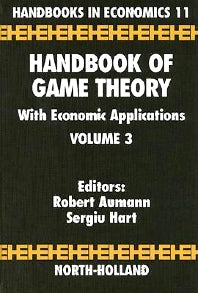Freshly Printed - allow 10 days lead
Couldn't load pickup availability
Handbook of Game Theory with Economic Applications
R.J. Aumann (Edited by), S. Hart (Edited by)
9780444894281, Elsevier Science
Hardback, published 19 August 2002
890 pages
24.4 x 17.5 x 4.3 cm, 1.76 kg
"This is the third and last volume of the Handbook of Game Theory with Economic Applications. ...The authors are the most eminent practitioners in the field, including three Nobel Prinze winners." --Zentralblatt fur Mathematik, vol. 993, 2002
"Volume 3 of a three-volume set surveying the state of the art in game theory." --Journal of Economic Literature
"No one can keep up with the whole literature, so we have come to recognize these volumes as immensely valuable. They are on almost everyone's shelf. ...I would love to see volumes 4, 5, and 6, with more of what Aumann and Hart and their authors have given us. The Handbook has become the first reference for anyone who wants to learn of game-theoretical results outside their own area. It has been a long task for the editors but has greatly benefited the rest of us, and we are all grateful." --Games and Economic Behavior, Vol. 46, no. 1
This is the third volume of the Handbook of Game Theory with Economic Applications. Since the publication of multi-Volume 1 a decade ago, game theory has continued to develop at a furious pace, and today it is the dominant tool in economic theory. The three volumes together cover the fundamental theoretical aspects, a wide range of applications to economics, several chapters on applications to political science and individual chapters on applications to disciplines as diverse as evolutionary biology, computer science, law, psychology and ethics. The authors are the most eminent practitioners in the field, including three Nobel Prize winners. The topics covered in the present volume include strategic ("Nash") equilibrium; incomplete information; two-person non-zero-sum games; noncooperative games with a continuum of players; stochastic games; industrial organization; bargaining, inspection; economic history; the Shapley value and its applications to perfectly competitive economies, to taxation, to public goods and to fixed prices; political science; law mechanism design; and game experimentation.
Preface (R.J. Aumann, S. Hart). Strategic equilibrium (E. van Damme). Foundations of strategic equilibrium (J. Hillas, E. Kohlberg). Incomplete information (R.J. Aumann, A. Heifetz). Non-zero-sum two-person games (T.E.S. Raghavan). Computing equilibria for two-person games (B. von Stengel). Non-cooperative games with many players (M. Ali Khan, Y. Sun). Stochastic games (J-F. Mertens). Stochastic games: recent results (N. Vieille). Game theory and industrial organization (K. Bagwell, A. Wolinsky). Bargaining with incomplete information (L.M. Ausubel, P. Cramton, R.J. Deneckere). Inspection Games (R. Avenhaus, B.V. Stengel, S.Zamir). Economic history and game theory (A. Greif). The shapley value (E. Winter). Variations on the shapley value (D. Monderer, D. Samet). Values of non-transferable utility games (R. McLean). Values of games with infinitely many players (A. Neyman). Values of perfectly competitive economies (S. Hart). Some other economic applications of the value (J-F. Mertens). Strategic aspects of political systems (J. Banks). Game-theoretic analysis of legal rules and institutions (J-P. Benoit, L.A. Kornhauser). Implementation Theory (T. Palfrey). Game Theory and experimental Gaming (M. Shubik).
Subject Areas: Game theory [PBUD], Economic theory & philosophy [KCA], Economics [KC]


